If there is one lesson science fiction teaches us, it is that just as non-crab crustaceans will eventually evolve a crab-like body plan, so too will every state eventually transform into a thinly veiled version of Rome (Republic or Empire). This outcome seems almost inevitable regardless of the state’s original political structure, its technological base, or even whether it is confined to one world or spread across many planets.
Don’t believe me? Why, consider these five works featuring Roman carcinization.
Pebble in the Sky by Isaac Asimov (1950)
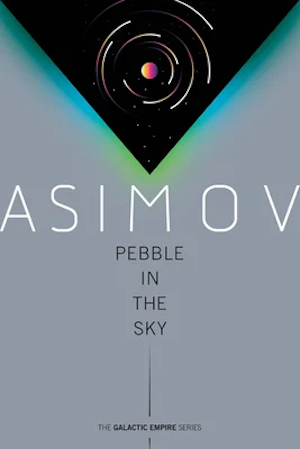
A scientific mishap propels Joseph Schwartz through space/time to a desolate world. What at first appears to be an alien planet is none other than Schwartz’ native Earth, transformed by time and atomic war. A once-verdant world is now a dying planet, its impoverished population reduced to a bare twenty million people.
As Schwartz discovers, the Earth is now a province of the Galactic Empire. Empire and Earth enjoy the same cordial relationship that existed between Vespasian’s Rome and the Zealots’ Judea. Earth craves independence. As the Empire has one populated planet for every human living on Earth, the balance of power favors the Empire… thus the crime against humanity that certain Earth extremists are now plotting.
Asimov was kind enough to record his formula for success in the form of a poem:
So success is not a mystery, just brush up on your history, and borrow day by day.
Take an Empire that was Roman and you’ll find it is at home in all the starry Milky Way.
With a drive that’s hyperspatial, through the parsecs you will race, you’ll find that plotting is a breeze,
With a tiny bit of cribbin’ from the works of Edward Gibbon and that Greek, Thucydides.
This approach worked out quite well for Asimov. One could say it was the foundation on which his reputation rested.
The Day of Their Return by Poul Anderson (1973)
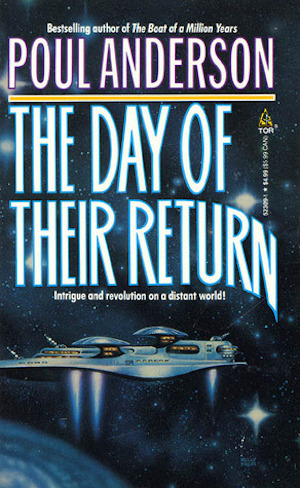
Having reinvented Roman Imperial governance to end the chaos that followed the collapse of the Polesotechnic League, the Terran Empire faces the same dynastic instability that plagued the Roman Empire. Hugh McCormac’s recent attempted coup failed and McCormac fled. McCormac’s native world Aeneas has been occupied.
Although the Terran Commissioner Chunderban Desai is surprisingly humane and competent for an Imperial official, Aeneas is a hotbed of discontent. It is an ideal planet on which Terra’s rival, the Roidhunate of Mersia1, can stir up trouble. And so, Mersia’s greatest agent, telepath Aycharaych, is dispatched to transform Aeneasian myth and legend into a weapon against the Empire.
I bet you thought I’d use one of Anderson’s James-Bond-like Dominic Flandry novels2. I much prefer Aycharaych to Flandry and The Day of Their Return is as close as Anderson got to an Aycharaych novel. There is a very Bond-like element to this novel3: for some reason, Aycharaych goes undercover on Aeneas under his real name.
The Myriad by R.M. Meluch (2005)
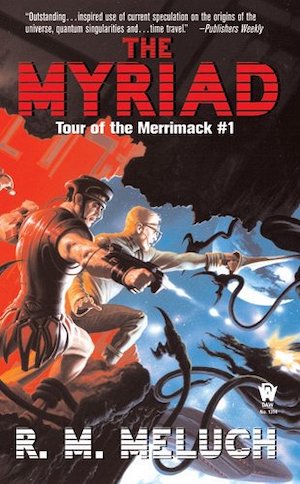
25th-century America prevails, much to the irritation of the League of Earth Nations. America’s only serious rival is the surprisingly Romanesque polity based on the former American colony Palatine. When Palatine requests American assistance with the alien Hive, the USS Merrimack is dispatched to aid the upstart colonists. AMERICA! Unless you’re from Palatine, in which case SENATUS POPULUSQUE ROMANUS.
Investigating the Hive leads Merrimack to a globular cluster4, whose three inhabited worlds seemingly lack faster-than-light drives, yet clearly possess some superluminal means of transportation. The explanation to this paradox will put history itself in parallel.
Palatine is surprisingly Romanesque because it is literally Roman. It seems some Romans spent 1800 years hiding amongst the post-Imperial barbarians until the opportunity arose to re-establish Rome. Surprisingly, that is not the most implausible element of the novel.
With the Lightnings by David Drake (1998)
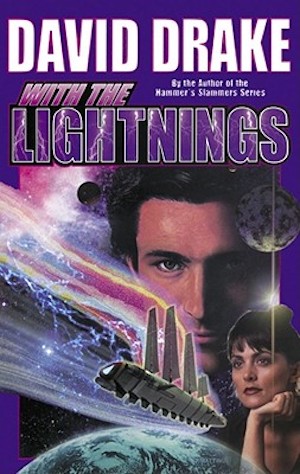
Both Lt. Daniel Leary of the Republic of Cinnabar Navy and librarian Adele Mundy face professional challenges thanks to a common source. Having quarreled with his powerful father, Lt. Leary no longer benefits from his father’s influence. Adele’s family having quarreled with the senior Leary’s political faction, Adele is the sole survivor of the violent purge that eliminated the Mundys of Chatsworth. Despite the common cause of their problems, Daniel and Adele seem unlikely allies, let alone friends.
Enter the wildly misleadingly named Alliance of Free Stars. The Alliance’s current project involves provoking discord on Republic ally Kostroma. Kostroma is the very world on which Adele is employed as a librarian. Kostroma is the very world Daniel is stationed. Bad luck for the Alliance.
While most descriptions of the RCN series hammer the parallels with Patrick O’Brian’s Aubrey-Maturin series (or if the reviewer has not heard of O’Brian, C.S. Forester’s Hornblower series), Cinnabar’s political culture appears to owe quite a lot to Rome. More specifically, there appear to be echoes of the Crisis of the Roman Republic, a terrible time to live but a wonderful time for adventures. But perhaps I read too much into Cinna and Cinnabar.
First Citizen by Thomas T. Thomas (1987)
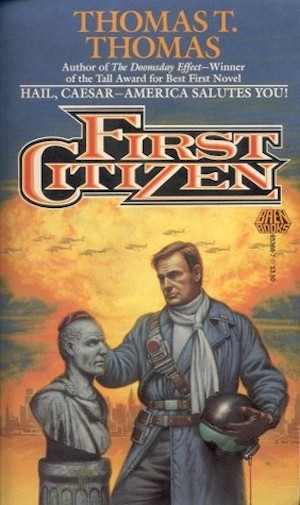
Late 20th-century America’s bold repudiation of its debt and courageous amendment forbidding federal taxes transformed the economy, although perhaps not in the positive manner Americans would have preferred. Economic turmoil was accompanied by nuclear terrorism and a wave of presidential assassinations. At least Americans did not have to worry about being bored.
Calamity for America is opportunity for James Corbin. Ambitious and amoral, Corbin uses military adventures and political gambits to claw his way up the American hierarchy. Of course, his ascendance makes Corbin a target… but that only means Corbin must strike first and far more ruthlessly than his rivals, something Corbin is willing and able to do.
It’s no mistake that James Corbin and Julius Caesar share initials. Corbin’s career maps onto Caesar’s (although Corbin has more tactical nukes at his disposal than Caesar did). This suggests that Corbin is right to be optimistic about his odds of winning. But it also hints that his lifespan5 once he becomes First Citizen may be rather short….
There are hardly the only Roman reenactments SF has to offer. In fact, I hear Megalopolis owes something to Rome. The above may not be your favorite examples (Megalopolis does not seem to be anyone’s favorite example, although as I have not seen it, I cannot comment further). Feel free to mention your favorites in comments below.

